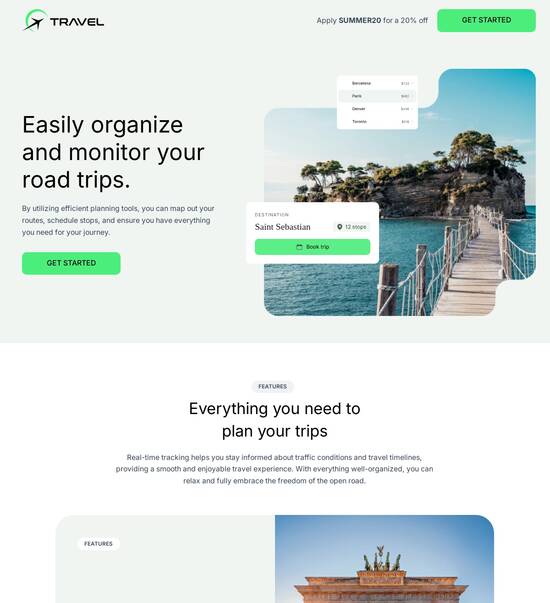
Microsite Template for Construction Engineers
Explore Similar TemplatesAbout template
Create customized microsites for construction projects with Instapage's easy-to-use platform.
Recommended templates

Easy to build without coding
With the intuitive drag-and-drop builder, anyone on your team can create high-converting pages without any knowledge of code or design. Make enhancements to your landing page with custom widgets using Javascript, HTML/CSS, or third-party scripts.

Multiple layouts for any industry and goal
Select from 500+ landing page layouts built to boost conversions across industry-specific scenarios. Customize them by adjusting fonts, adding images, and generating on-brand content with the AI assistant. Quickly scale with Instablocks® and Global Blocks that you can save, reuse, and update globally.

Loads fast and looks polished on any device
Every template is responsive, which means they present professionally on any device and load blazingly fast with our Thor Render Engine. You can also power them up with Google AMP technology to deliver an unparalleled mobile experience and drive higher conversions.

Robust analytics & experimentation
Get real-time updates and reporting across all your devices, showing the number of visitors, conversions, cost-per-visitor, and cost-per-lead. Launch AI-powered experiments, run A/B tests, and use heatmaps to analyze user behavior, then optimize your landing page to maximize conversions.







Easy to build without coding
With the intuitive drag-and-drop builder, anyone on your team can create high-converting pages without any knowledge of code or design. Make enhancements to your landing page with custom widgets using Javascript, HTML/CSS, or third-party scripts.
Multiple layouts for any industry and goal
Select from 500+ landing page layouts built to boost conversions across industry-specific scenarios. Customize them by adjusting fonts, adding images, and generating on-brand content with the AI assistant. Quickly scale with Instablocks® and Global Blocks that you can save, reuse, and update globally.
Loads fast and looks polished on any device
Every template is responsive, which means they present professionally on any device and load blazingly fast with our Thor Render Engine.
Robust analytics & experimentation
Get real-time updates and reporting across all your devices, showing the number of visitors, conversions, cost-per-visitor, and cost-per-lead. Launch AI-powered experiments, run A/B tests, and use heatmaps to analyze user behavior, then optimize your landing page to maximize conversions.
All the features you need to build lead-generating landing pages
Explore more featuresLearn how to build top-performing landing pages for any goal
FAQs
Leading the way in building high-performing landing pages





The ultimate guide to using Instapage for effective landing pages
In digital marketing, creating compelling landing pages is crucial for converting visitors into leads. Instapage offers a powerful landing page and conversion rate optimization platform that empowers marketers, particularly in sectors like marketing, education, and financial services, to accelerate and optimize their digital campaigns effectively. This guide will walk you through the essential steps and features of using Instapage to maximize your marketing ROI.
Understanding Instapage
Instapage is designed for marketers seeking to create high-performing landing pages quickly and effectively. With its user-friendly interface, individuals in departments like marketing and advertising can craft professional-looking pages without the need for coding skills. The platform equips users with over 100 ready-to-use templates that cater to various industries, from business services to tech and SaaS.
- 100+ high-converting templates: Pre-designed layouts streamline the page creation process.
- Intuitive builders: Drag-and-drop functionality makes design easy, even for non-technical users.
- Lead generation elements: Integrated tools help capture leads seamlessly.
How to create landing pages with Instapage
Getting started with Instapage is simple. Follow these key steps to create a landing page tailored to your audience.
Step 1: Choose your template
Begin by selecting a template that aligns with your campaign goals and audience. Instapage provides templates specifically tailored for different industries, ensuring relevance.
- Explore niche-specific templates: For example, education or financial service templates help align your message.
- Utilize dynamic text replacement: Personalize your content automatically to enhance user engagement.
- Take advantage of A/B testing: Validate your approach by comparing different versions of your landing page.
Step 2: Customize your landing page
Once you've selected a template, customize it to reflect your brand identity and messaging. Leverage the intuitive builders to make real-time edits.
- Incorporate branding elements: Use your logo and brand colors.
- Edit copy effectively: Ensure your messaging aligns with your audience's needs.
- Add multimedia elements: Incorporate images or videos to boost user engagement.
With your landing page set up, make use of built-in optimization tools to enhance performance.
Ready to take your digital marketing campaigns to the next level? Explore how Instapage can transform your approach and maximize ROI today!
Microsite template for construction engineers: Enhancing your digital presence
Understanding the microsite template landscape for construction engineers
In the construction industry, effective communication is crucial for success. A microsite template specifically designed for construction engineers serves as a dedicated online space that highlights projects, expertise, and services, facilitating better engagement with clients and stakeholders. By utilizing such templates, construction firms can tailor their message to meet the unique needs of their industry, ensuring that potential clients have immediate access to vital information.
The rise of microsites in the construction industry
Microsites have gained traction in the construction industry, primarily due to their focused approach and ease of use. These small, dedicated websites allow construction engineers and firms to present targeted information without the clutter of a full website. By concentrating on specific projects or services, construction microsites can effectively attract and retain customer attention.
One key factor contributing to the rise of microsites is the changing behavior of consumers. With an increasing number of clients seeking instant information online, the demand for condensed, easily navigable websites has surged. Creating a microsite enables construction firms to provide essential details quickly, leading to higher conversion rates.
The definition and purpose of microsites
How microsites distinguish themselves in the construction sector
Industry trends influencing microsite adoption
Key features of microsite templates for construction engineers
A well-designed microsite template is vital for construction engineers looking to showcase their work. One of the critical features is responsive design, ensuring that the microsite functions seamlessly across various devices. This compatibility enhances user experience and allows potential clients to engage with the site, whether they are on a mobile device or desktop.
Furthermore, tailored layouts specific to engineering and construction can effectively highlight project showcases and case studies. By integrating visually appealing elements and easy-to-navigate sections, microsite templates can make a lasting impression on visitors.
Responsive design for all construction projects
Tailored layouts for engineering and construction
Built-in SEO features for enhanced visibility
Essential elements of an engaging construction microsite
Design customization is crucial when it comes to creating a unique microsite. Utilizing CSS for specific styling can greatly enhance a site's aesthetics, making it more appealing to visitors. Moreover, selecting color schemes that resonate with engineering themes can reinforce brand identity and create a cohesive look throughout the site.
High-quality visual content, including images and videos, is another essential element. Showcasing past projects using professional photos and engaging video content can help demonstrate a firm's capabilities. Furthermore, prioritizing user experience (UX) through seamless navigation and fast loading times improves overall site engagement.
Template design customization
Compelling visual content
User experience (UX) focus
Advantages of using a dedicated microsite template
Utilizing a dedicated microsite template offers several advantages, particularly for construction engineers. One significant benefit lies in the streamlined project promotion process. With a focused platform, construction firms can effectively showcase multiple projects, enabling potential clients to quickly grasp the scope of their expertise.
By creating a professional online presence, businesses can enhance brand identity and build authority within the construction industry. Trust is key in construction; therefore, having a well-designed microsite can positively influence overall perception among clients. Additionally, dedicated microsite features allow for improved communication with stakeholders, facilitating client engagement and effective lead capture.
Streamlined project promotion
Enhanced brand identity and authority
Improved communication with stakeholders
Navigating and customizing microsite templates
Getting started with microsite templates is both straightforward and efficient. Many platforms offer a range of downloadable templates that are easy to set up. It's important to choose a platform that best suits your needs and ensure that the templates are compatible with your preferred devices. Popular options include WordPress, Wix, and Instapage, each providing various pre-designed templates tailored to the construction field.
Once you have chosen a template, personalizing it is essential. Incorporating your company's logo and unique color schemes allows for consistent branding across all your digital platforms. Additionally, integrating third-party tools and plugins can further enhance the functionality of your microsite, improving analytics and project management capabilities.
Step-by-step guide to downloading and setting up templates
Personalizing your template: best practices
Integrating third-party tools and plugins
Showcasing projects through effective template utilization
Crafting detailed project case studies is vital for demonstrating expertise and building trust. Each case study should include key components such as project goals, challenges faced, and solutions implemented. Structuring case studies clearly and logically ensures potential clients can easily digest the information and appreciate the firm's problem-solving capabilities.
Highlighting key documents and reports also adds depth to the site content. Including relevant data provides further insights into project scope and achievements. Lastly, showcasing client testimonials is invaluable, as positive feedback serves as social proof and promotes credibility within the construction industry.
Crafting detailed project case studies
Highlighting key documents and reports
Utilizing testimonials to build credibility
Tracking success and optimization of microsites
Tracking the success of your microsite is crucial for ongoing improvement. Monitoring user engagement, conversion rates, and other key performance indicators (KPIs) can provide insights into what works and what needs adjustment. Key metrics may include page views, average session duration, and click-through rates—all valuable in determining the effectiveness of your website.
Implementing A/B testing can also refine the user experience. Testing different designs, content layouts, or CTAs enables you to understand better what appeals to your target audience. Continuous improvement through feedback loops and regular updates can future-proof your microsite against evolving trends and preferences within the construction industry.
Metrics to measure effectiveness
A/B testing: finding what works
Continuous improvement and iteration
Future trends in microsite development for construction engineers
As technology continues to evolve, the landscape of microsite development for construction engineers is also changing. Emerging technologies such as artificial intelligence (AI) and machine learning are beginning to influence microsite features and functionalities. These advancements promise improved user experiences and more personalized interactions with potential clients.
Sustainability is becoming increasingly important in all aspects of the construction industry, and this is reflected in digital design as well. Designing templates that promote eco-friendly building practices can appeal to environmentally conscious clients. Additionally, the growth of interactive and dynamic content such as augmented reality (AR) and virtual reality (VR) technologies is set to create more immersive experiences for clients, showcasing projects in innovative ways.
Trends shaping the future of construction microsites
Sustainability and eco-friendly design in templates
The growth of interactive and dynamic content
Ready to skyrocket conversions?
Supercharge your ad campaigns with high-performing landing pages
Get started














